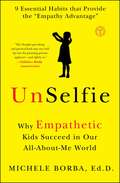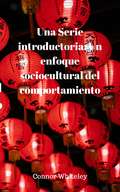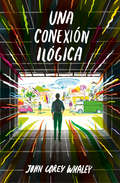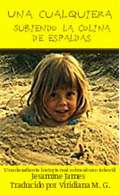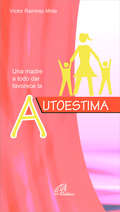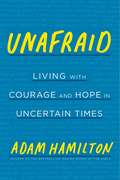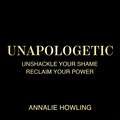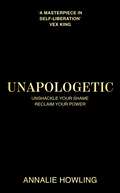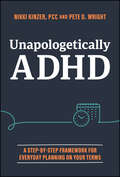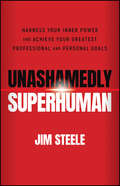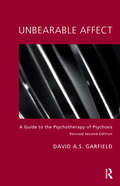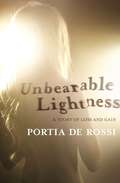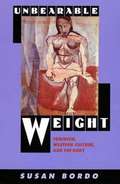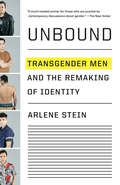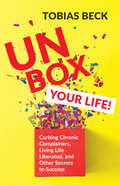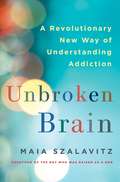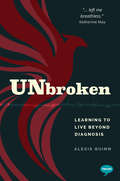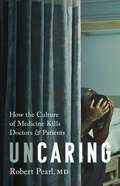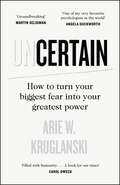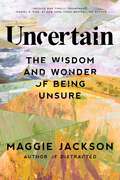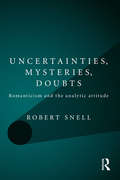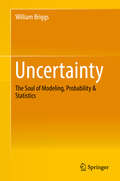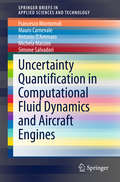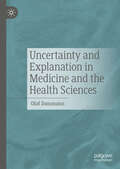- Table View
- List View
UnSelfie: Why Empathetic Kids Succeed in Our All-About-Me World
by Michele BorbaBestselling author Michele Borba offers a 9-step program to help parents cultivate empathy in children, from birth to young adulthood--and explains why developing a healthy sense of empathy is a key predictor of which kids will thrive and succeed in the future.Is the Selfie Syndrome Undermining Our Kids' Future? Teens today are 40 percent less empathetic than they were thirty years ago. Why is a lack of empathy--which goes hand-in-hand with the self-absorption epidemic Dr. Michele Borba calls the Selfie Syndrome--so dangerous? First, it hurts kids' academic performance and leads to bullying behaviors. Also, it correlates with more cheating and less resilience. And once children grow up, a lack of empathy hampers their ability to collaborate, innovate, and problem-solve--all must-have skills for the global economy. In UnSelfie Dr. Borba pinpoints the forces causing the empathy crisis and shares a revolutionary, researched-based, 9-step plan for reversing it. Readers will learn: -Why discipline approaches like spanking, yelling, and even time-out can squelch empathy -How lavish praise inflates kids' egos and keeps them locked in "selfie" mode -Why reading makes kids smarter and kinder -How to help kids be Upstanders--not bystanders--in the face of bullying -Why self-control is a better predictor of wealth, health, and happiness than grades or IQ -Why the right mix of structured extracurricular activities and free play is key for teaching collaboration -How to ignite a Kindness Revolution in your kids and community The good news? Empathy is a trait that can be taught and nurtured. Dr. Borba offers a framework for parenting that yields the results we all want: successful, happy kids who also are kind, moral, courageous, and resilient. UnSelfie is a blueprint for parents and educators who want to kids shift their focus from I, me, and mine...to we, us, and ours.
Una Serie introductoria: Un enfoque sociocultural del comportamiento
by Connor Whiteley¿Cómo afecta la globalización a nuestro comportamiento? ¿Afecta nuestra cultura a nuestros hábitos de compra? ¿Podría la aculturación explicar los niveles de obesidad en los emigrantes? Estas son sólo algunas de las preguntas interesantes e importantes que exploraremos en este libro mientras exploramos cómo los factores sociales y culturales afectan nuestro comportamiento. Así que, únanse a mí mientras exploramos juntos el fascinante mundo de la psicología social en este libro con un tono de conversación intrigante que claramente desglosa y evalúa críticamente los conceptos y teorías para que todos puedan disfrutar de las maravillas de la psicología.... ¡y no tengan un dolor de cabeza al final!
Una conexión ilógica
by John Corey WhaleysSolomon tiene 16 años, es agorafóbico..., pero le va bien. Lisa está dispuesta a todo con tal de entrar a una de las mejores facultades de psicología del país, y «arreglar» a Solomon es justo lo que necesita para conseguirlo, lo quiera él o no. #BibliotecaIndie Solomon es muy fan de Star Trek y se ha embarcado en su propia misión, que dura ya tres años, dos meses y un día. La última frontera para él parece ser el umbral de su casa y la agorafobia lo mantiene encerrado en ella. Aunque Solomon está más que satisfecho siendo el rey de la casa, con el pijama como uniforme y sus padres ausentes casi todo el día. Pero todo cambiará cuando conozca a Lisa. Su sueño es conseguir plaza en la segunda mejor Facultad de Psicología del país (está siendo realista, por eso es la segunda). Está muy segura de sí misma y, junto con su encantador novio Clark, intentará cambiar la vida de Sol. Su amistad será mucho más íntima de lo que esperaban. Pero ¿qué sucederá cuando Sol descubra los planes de Lisa? Divertida y emocionante, Una conexión ilógica aborda las distintas maneras en que nos enfrentamos a nuestros miedos y nos escondemos del mundo, y cómo el amor, la tragedia y la necesidad de conectar pueden ser aquello que nos despierte de nuevo. Reseñas:«Cargada de estilo, sensibilidad y humor... ELECTRIZANTE.»The New York Times «Reirás, puede que llores... y no serás capaz de soltar el libro.»RT Book Reviews «Honesta, divertida e inolvidable.»Buzzfeed «Los capítulos rebosan de diálogos cálidos, inteligentes, auténticos... Los lectores querrán fácilmente a estos personajes brillantes, imperfectos y encantadoramente nerds.»Kirkus Reviews «Si buscáis una novela sencilla, rápidade leer y que os entretenga, esta está genial.» «Una lectura refrescante dentro de lo juvenil. Decir que me ha encantado es poco. En conjunto, este libro ha entrado de cabeza entre mis novelas juveniles favoritas del año.»A body made of words «Una gran reflexión sobre cómo nos enfrentamos a nuestros propios miedos. Una novela apasionante que te hará reír y pasar un buen rato.»
Una cualquiera – Subiendo la colina de espaldas: Una desafiante historia real sobre abuso infantil
by Jesamine James Viridiana M. G.Basada en la verdadera historia de una chica afrontando una infancia llena de abusos durante los años setentas en la región central de Inglaterra. En sus pesadillas escucha el eco de esa voz diciéndole “Incluso cuando muera, voy a venir a buscarte.” Es momento de que Jes entierre para siempre los fantasmas de Marie. A los seis años el mundo de Marie cambió por completo, volviéndose un lugar lleno de confusión, engaño y abuso. Ya no la llaman por su nombre, ahora se refieren a ella como una cualquiera. Su voluntad de sobrevivir se manifiesta a través de tácticas bastante extrañas, mientras se desvía en una infancia llena de locura y paranoia, pegamento, autolesiones y la voz de David Bowie resonando en sus oídos. Su mente elabora estrategias para lidiar con los continuos ataques que parecen no tener fin. La adultez es su vía de escape, si es que puede sobrevivir hasta llegar a ella, pero ¿se puede encerrar a los demonios para siempre en el pasado? Esta es la historia de la mente de una niña a merced de un monstruo real.
Una madre a todo dar aumenta la autoestima
by Vîctor Ramîrez MotaUna "madre a todo dar", significa que no debe lastimar a sus hijos ni física ni mentalmente, pero eso no significa que no le debe llamar la atención, y he aquí lo importante el conocer cómo llamarles la atención y como no lastimar su autoestima, sino elevársela. Mantener el equilibrio entre la libertad y las prohibiciones. Además de una madre a todo dar, tiene que llevarse muy bien con sus hijos, ya que, en estas épocas donde la influencia de los amigos y el medio ambiente que les rodea. Una madre a todo dar, sabe poner límites psicológicos sin lastimar la autoestima de sus hijos y además sabe invitar a que sus hijos cumplan con ellos.
Unafraid: Living with Courage and Hope in Uncertain Times (Unafraid Ser.)
by Adam HamiltonFear is a complex emotion. Sometimes it saves us. More often it robs us of the life we want. But we can take our lives back. You'd be hard-pressed to overstate the extent to which fear, anxiety, and worry permeate our lives today. Fear wreaks havoc on our relationships and communities. It leads us into making bad decisions. It holds us back from the very pursuits that promise fulfillment and joy. Making matters worse, not a week goes by when some new threat or calamity isn't dominating the headlines. Why are there so many tragedies? we wonder. What will happen next?As the senior pastor of a large, diverse church in America's heartland, Adam Hamilton has seen the cost of fear up close. When he surveyed his congregation on how fear affects them, 2,400 people responded--and what they said was eye-opening. Eighty percent admitted to living with moderate or significant levels of fear.Unafraid: Living with Courage and Hope in Uncertain Times is Reverend Hamilton's insightful and impassioned response. Drawing on recent research, inspiring real-life examples, and fresh biblical insight, Hamilton shows how to untangle the knots we feel about disappointing others, failure, financial insecurity, loneliness, insignificance, and aging. Then he helps readers understand and counter fears related to such outsize perils as terrorism, death, and the apocalypse.Writing with generosity and intelligence, Hamilton shows how believer and unbeliever alike can develop sustaining spiritual practices and embrace Jesus's recurring counsel: "Do not be afraid." For anyone struggling with fear or wondering how families and communities can thrive in troubled times, Unafraid offers an informed and inspiring message full of practical solutions.
Unapologetic: Unshackle Your Shame, Reclaim Your Power
by Annalie Howling'Annalie Howling delivers a masterpiece in self-liberation. Unapologetic is a fierce call to reclaim your power, dismantle shame, and live authentically. A must-read for anyone ready to embrace their full potential.' - Vex KingShame thrives when we believe its lie, that we are so broken, so different, that we must hide, apologise and never be free. But this narrative is false. Shame is difficult to express, but in Unapologetic, I've given it a voice. On every page, I uncover the secrets shame tries to keep hidden. When we realize we're not alone, shame loses its grip, and we reclaim our power. It isolates us, damages our relationships, and keeps us disconnected but it doesn't have to. Unapologetic is the book that I wish that I had during the most isolating moments in my life when shame had me fully in its grasp. Through my own stories, expert insights, and real client experiences, I hope the reader will discover pieces of themselves and start to reclaim the parts they thought were lost. Unapologetic is more than a book; it's a call to break free from shame and step into your full potential.
Unapologetic: Unshackle Your Shame, Reclaim Your Power
by Annalie Howling'Annalie Howling delivers a masterpiece in self-liberation. Unapologetic is a fierce call to reclaim your power, dismantle shame, and live authentically. A must-read for anyone ready to embrace their full potential.' - Vex KingShame thrives when we believe its lie, that we are so broken, so different, that we must hide, apologise and never be free. But this narrative is false. Shame is difficult to express, but in Unapologetic, I've given it a voice. On every page, I uncover the secrets shame tries to keep hidden. When we realize we're not alone, shame loses its grip, and we reclaim our power. It isolates us, damages our relationships, and keeps us disconnected but it doesn't have to. Unapologetic is the book that I wish that I had during the most isolating moments in my life when shame had me fully in its grasp. Through my own stories, expert insights, and real client experiences, I hope the reader will discover pieces of themselves and start to reclaim the parts they thought were lost. Unapologetic is more than a book; it's a call to break free from shame and step into your full potential.
Unapologetic: Unshackle Your Shame, Reclaim Your Power
by Annalie Howling'Annalie Howling delivers a masterpiece in self-liberation. Unapologetic is a fierce call to reclaim your power, dismantle shame, and live authentically. A must-read for anyone ready to embrace their full potential.' - Vex KingShame thrives when we believe its lie, that we are so broken, so different, that we must hide, apologise and never be free. But this narrative is false. Shame is difficult to express, but in Unapologetic, I've given it a voice. On every page, I uncover the secrets shame tries to keep hidden. When we realize we're not alone, shame loses its grip, and we reclaim our power. It isolates us, damages our relationships, and keeps us disconnected but it doesn't have to. Unapologetic is the book that I wish that I had during the most isolating moments in my life when shame had me fully in its grasp. Through my own stories, expert insights, and real client experiences, I hope the reader will discover pieces of themselves and start to reclaim the parts they thought were lost. Unapologetic is more than a book; it's a call to break free from shame and step into your full potential.
Unapologetically ADHD: A Step-by-Step Framework For Everyday Planning On Your Terms
by Nikki Kinzer Pete D. WrightStep-by-step yet flexible blueprint to plan long term goals, projects, and tasks when living with ADHD Written by Nikki Kinzer and Pete D. Wright, co-hosts of the hit podcast Taking Control: The ADHD Podcast with more than one million annual downloads, Unapologetically ADHD helps readers plan for long term goals, projects, and tasks that need to get done, providing a step-by-step outline for success that still allows for plenty of individual flexibility. An accessible and also fun read, this book is intentionally organized into clear sections within chapters and includes engaging visuals throughout. Readers get access to various coaching strategies, such as powerful questions and exercises, to help them move towards planning success on their own terms. In this book, you'll find information on: Understanding how the ADHD mind works and how to manage “all or nothing” mode Letting go of the shame that so many with ADHD feel and the concept of RSD (rejection sensitive dysphoria) acceptance Using practical tips that can be applied immediately to help you feel more in control of your life With a perfect balance between planning strategies and real conversations on what it's like to have ADHD, Unapologetically ADHD earns a well-deserved spot on the bookshelves of everyone with ADHD who wants to master an often-challenging executive function to live a more structured and fulfilling life.
Unashamedly Superhuman: Harness Your Inner Power and Achieve Your Greatest Professional and Personal Goals
by Jim SteeleTap into pools of pure potential you didn&’t even know you had In Unashamedly Superhuman: Harness Your Inner Power and Achieve Your Greatest Professional and Personal Goals, celebrated speaker, strategist, executive coach, and author Jim Steele delivers an incisive and eye-opening guide to unlocking the hidden wells of potential in each of us. Grounded in the latest neuroscience research and some of the best executive coaching techniques on the market today, the book shows you how to minimize distraction, eliminate unnecessary uncertainty and indecision, and reveal what you&’re truly capable of. In the book, you&’ll discover how to realize your wildest professional and personal goals by: Harnessing the power of flow to increase your productivity beyond what you thought possible Tap into mindfulness to uncover what your mind is really capable of Meaningfully challenge yourself – without creating intolerable frustration – by leading yourself and others on adventuresAn indispensable resource for executives, managers, and other business leaders, Unashamedly Superhuman is the can&’t-miss guide to peak performance you&’ve been waiting for.
Unbearable Affect: A Guide to the Psychotherapy of Psychosis (General And Clinical Psychiatry Ser.)
by David GarfieldIn this cohesive, dramatic, and highly readable book, the author establishes a roadmap for the diagnosis and psychotherapeutic treatment of psychotic disorders based on finding, understanding and reordering of unbearable affect. He provides concrete clinical advice, vivid examples, and crisp jargon-free descriptions of theoretical concepts and clinical techniques. Most of all, he demonstrates that it is possible for psychotic patients to take control of their conditions, rebuild family relationships, and establish themselves in the viable productive lives that they have long despaired of achieving.
Unbearable Lightness: A Story of Loss and Gain
by Portia De RossiI didn't decide to become anorexic. It snuck up on me disguised as a healthy diet, a professional attitude. Being as thin as possible was a way to make the job of being an actress easier . . . Portia de Rossi weighed only 82 pounds when she collapsed on the set of the Hollywood film in which she was playing her first leading role. This should have been the culmination of all her years of hard work first as a child model in Australia, then as a cast member of one of the hottest shows on American television. On the outside she was thin and blond, glamorous and successful. On the inside, she was literally dying. In this searing, unflinchingly honest book, Portia de Rossi captures the complex emotional truth of what it is like when food, weight, and body image take priority over every other human impulse or action. She recounts the elaborate rituals around eating that came to dominate hours of every day, from keeping her daily calorie intake below 300 to eating precisely measured amounts of food out of specific bowls and only with certain utensils. When this wasn't enough, she resorted to purging and compulsive physical exercise, driving her body and spirit to the breaking point. Even as she rose to fame as a cast member of the hit television shows Ally McBeal and Arrested Development, Portia alternately starved herself and binged, all the while terrified that the truth of her sexuality would be exposed in the tabloids. She reveals the heartache and fear that accompany a life lived in the closet, a sense of isolation that was only magnified by her unrelenting desire to be ever thinner. With the storytelling skills of a great novelist and the eye for detail of a poet, Portia makes transparent as never before the behaviors and emotions of someone living with an eating disorder. From her lowest point, Portia began the painful climb back to a life of health and honesty, falling in love with and eventually marrying Ellen DeGeneres, and emerging as an outspoken and articulate advocate for gay rights and women's health issues. In this remarkable and beautifully written work, Portia shines a bright light on a dark subject. A crucial book for all those who might sometimes feel at war with themselves or their bodies, Unbearable Lightness is a story that inspires hope and nourishes the spirit.
Unbearable Weight: Feminism, Western Culture, and the Body
by Susan BordoFantastic study of women and their bodies. This 10th anniversary edition has a new preface by the author plus a foreword by Leslie Haywood, feminist scholar superstar, an authority on women athletes and body builders. When originally published in 1993, it made the list of NYT Notable Books of the Year.
Unbound: Transgender Men and the Remaking of Identity
by Arlene SteinAn intimate portrait of a new generation of transmasculine individuals as they undergo gender transitions Award-winning sociologist Arlene Stein takes us into the lives of four strangers who find themselves together in a sun-drenched surgeon’s office, having traveled to Florida from across the United States in order to masculinize their chests. <P><P>Ben, Lucas, Parker, and Nadia wish to feel more comfortable in their bodies; three of them are also taking testosterone so that others recognize them as male. <P>Following them over the course of a year, Stein shows how members of this young transgender generation, along with other gender dissidents, are refashioning their identities and challenging others’ conceptions of who they are. <P>During a time of conservative resurgence, they do so despite great personal costs. <P>Transgender men comprise a large, growing proportion of the trans population, yet they remain largely invisible. In this powerful, timely, and eye-opening account, Stein draws from dozens of interviews with transgender people and their friends and families, as well as with activists and medical and psychological experts. <P>Unbound documents the varied ways younger trans men see themselves and how they are changing our understanding of what it means to be male and female in America.
Unbox Your Life!: Curbing Chronic Complainers, Living Life Liberated, and Other Secrets to Success
by Tobias Beck“Unbox Your Life will take you on an exciting journey of self-discovery and to a fulfilling life of meaning and purpose.” —Sean Covey, president of FranklinCovey Education and New York Times bestselling author of The 4 Disciplines of ExecutionIn this international bestseller, Tobias Beck shows you how to successfully steer your own life instead of having it determined by others.Keep killjoys, energy vampires, and chronic complainers out of your life with Tobias Beck’s Liberated® philosophy. Polarizing, provocative, and unconventional, Unbox Your Life urges readers to liberate themselves from a negative attitude, navigate a highly sensitive personality, and finally live successfully and authentically.Unbox Your Life follows Beck’s own inspiring story about success and what it really means. Pairing fifteen years of experience in personality development and behavioral psychology with stories that are as entertaining as they are instructive, Unbox Your Life provides:Self-motivation tips to help you forge your own path and be guided by your dreamsAdvice to seek out people who support you, let you grow, and move forwardFunny comics that illustrate proven-to-work strategies
Unbroken Brain: A Revolutionary New Way of Understanding Addiction
by Maia SzalavitzChallenging both the idea of the addict's 'broken brain' and the notion of a simple 'addictive personality,' this book offers a radical and groundbreaking new perspective, arguing that addictions are learning disorders and shows how seeing the condition this way can untangle our current debates over treatment, prevention, and policy.
Unbroken: Learning to Live Beyond Diagnosis (Inspirational Series)
by Alexis QuinnAlexis Quinn has always known she was different. Academically and athletically gifted, she soared through her years in education, but failed to socialise adequately with her peers. Somehow, social norms just passed her by. But her difference had always been her strength, until the birth of her child, and the death of her brother, Josh; then her difference became her downfall. Unable to deal with the reality of what happened with Josh, Alexis was detained under the mental health act against her will. She found herself struggling for years, with diagnosis after diagnosis landing on her shoulders. Told repeatedly by doctors that she was dangerous, Alexis tried to become the person the system wanted her to be: someone normal. But it seemed that normal was always just out of reach.As time went by, she realised that the care she thought was going to help her, might just be the very thing that would destroy her.
Uncaring: How the Culture of Medicine Kills Doctors and Patients
by Robert PearlDoctors are taught how to cure people. But they don&’t always know how to care for them.Hardly anyone is happy with American healthcare these days. Patients are getting sicker and going bankrupt from medical bills. Doctors are burning out and making dangerous mistakes. Both parties blame our nation&’s outdated and dysfunctional healthcare system. But that&’s only part of the problem.In this important and timely book, Dr. Robert Pearl shines a light on the unseen and often toxic culture of medicine. Today&’s physicians have a surprising disdain for technology, an unhealthy obsession with status, and an increasingly complicated relationship with their patients. All of this can be traced back to their earliest experiences in medical school, where doctors inherit a set of norms, beliefs, and expectations that shape almost every decision they make, with profound consequences for the rest of us.Uncaring draws an original and revealing portrait of what it&’s actually like to be a doctor. It illuminates the complex and intimidating world of medicine for readers, and in the end offers a clear plan to save American healthcare.
Uncertain: How to Turn Your Biggest Fear into Your Greatest Power
by Arie KruglanskiTO ACHIEVE THE EXTRAORDINARY, FIRST EMBRACE THE UNKNOWN . . .Discover the definitive guide to our fear of uncertainty, and how we can stop it from holding us back'Groundbreaking' MARTIN SELIGMAN'One of my very favorite psychologists in the world' ANGELA DUCKWORTH'This is the book we've been waiting for' CAROL DWECK, bestselling author of Mindset: The New Psychology of Success____________Do you fear uncertainty?Why is the unknown so paralysing?And how can we use doubt to our advantage?Our safe modern world has wired us to fear the unknown, rather than use it to our benefit. But what if there was a way of turning that uncertainty into our greatest strength? Imagine being able to make important decisions without anxiety. Imagine being the calm at the centre of every storm.In Uncertain, the world-renowned psychologist Professor Arie Kruglanski shows us that there's only one certain way to face the unknown, and that is to fundamentally change the way we perceive it.This definitive book will transform the way you think about the unknown. Suddenly, you'll stop fearing uncertainty and learn to not only face it, but also harness the power that comes with it.Don't let uncertainty rule your life.Instead, embrace it and achieve the extraordinary.____________'This groundbreaking book is the place to go to discover how to embrace uncertainty and turn it to your growth and benefit' Martin Seligman, author of The Hope Circuit'One of my very favorite psychologists in the world tackles a subject that is both timeless and timely [and] shows us that though uncertainty is inevitable, how we react to it is not' Angela Duckworth, bestselling author of Grit'This is the book we've been waiting for. With his tremendous spirit, wit, knowledge, and wisdom, Kruglanski give us a book that helps us understand and navigate the uncertain world we live in. It's both based on science and filled with humanity-with deep compassion and benevolent guidance. It is a book for our time' Carol Dweck, author of Mindset: The New Psychology of Success'If you're not sure if you need this book, then you do. Original, insightful, and thought-provoking, the world's expert on the psychology of uncertainty reveals what science can tell us about our lives on the razor's edge' Daniel Gilbert, the New York Times bestselling author of Stumbling on Happiness'If there's anything I'm certain about, is that you'll love this book' Ayelet Fishbach, author of Get It Done
Uncertain: The Wisdom and Wonder of Being Unsure
by Maggie JacksonA revolutionary guide to flourishing in times of flux and angst by harnessing the overlooked power of our uncertainty. <P><P>In an era of terrifying unpredictability, we race to address complex crises with quick, sure algorithms, bullet points, and tweets. How could we find the clarity and vision so urgently needed today by being unsure? Uncertain is about the triumph of doing just that. A scientific adventure tale set on the front lines of a volatile era, this epiphany of a book by award-winning author Maggie Jackson shows us how to skillfully confront the unexpected and the unknown, and how to harness not-knowing in the service of wisdom, invention, mutual understanding, and resilience. <P><P>Long neglected as a topic of study and widely treated as a shameful flaw, uncertainty is revealed to be a crucial gadfly of the mind, jolting us from the routine and the assumed into a space for exploring unseen meaning. Far from luring us into inertia, uncertainty is the mindset most needed in times of flux and a remarkable antidote to the narrow-mindedness of our day. <P><P>In laboratories, political campaigns, and on the frontiers of artificial intelligence, Jackson meets the pioneers decoding the surprising gifts of being unsure. Each chapter examines a mode of uncertainty-in-action, from creative reverie to the dissent that spurs team success. Step by step, the art and science of uncertainty reveal being unsure as a skill set for incisive thinking and day-to-day flourishing.
Uncertainties, Mysteries, Doubts: Romanticism and the analytic attitude
by Robert SnellWhat is it to listen? How do we hear? How do we allow meanings to emerge between each other? 'This book is about what Freud called "freely" or "evenly suspended attention", a form of listening, a kind of receptive incomprehension, which is fundamental and mandatory for the practice of psychoanalysis and psychotherapy. The author steps outside the usual parameters of psychoanalytic writing and explores how works of art and literature which elicit and require such listening began to appear in Europe, in abundance, from the late eighteenth-century onwards. Uncertainties, Mysteries, Doubts is a timely reminder, in the present era of audit and manualisation, of some of psychoanalysis's deep and living cultural roots. It hopes- by immersing the reader in the emotional, critical and contextual worlds of some artists and poets of Romanticism- to help psychotherapists, psychoanalysts, and counsellors in the endless challenge of staying open to their clients and patients, faced as we all are, therapists and clients alike, by multiple pressures to knowledgeable closure.
Uncertainty
by William BriggsThis book presents a philosophical approach to probability and probabilistic thinking, considering the underpinnings of probabilistic reasoning and modeling, which effectively underlie everything in data science. The ultimate goal is to call into question many standard tenets and lay the philosophical and probabilistic groundwork and infrastructure for statistical modeling. It is the first book devoted to the philosophy of data aimed at working scientists and calls for a new consideration in the practice of probability and statistics to eliminate what has been referred to as the "Cult of Statistical Significance. " The book explains the philosophy of these ideas and not the mathematics, though there are a handful of mathematical examples. The topics are logically laid out, starting with basic philosophy as related to probability, statistics, and science, and stepping through the key probabilistic ideas and concepts, and ending with statistical models. Its jargon-free approach asserts that standard methods, such as out-of-the-box regression, cannot help in discovering cause. This new way of looking at uncertainty ties together disparate fields -- probability, physics, biology, the "soft" sciences, computer science -- because each aims at discovering cause (of effects). It broadens the understanding beyond frequentist and Bayesian methods to propose a Third Way of modeling.
Uncertainty Quantification in Computational Fluid Dynamics and Aircraft Engines
by Francesco Montomoli Mauro Carnevale Antonio D'Ammaro Michela Massini Simone SalvadoriThis book introduces novel design techniques developed to increase the safety of aircraft engines. The authors demonstrate how the application of uncertainty methods can overcome problems in the accurate prediction of engine lift, caused by manufacturing error. This in turn ameliorates the difficulty of achieving required safety margins imposed by limits in current design and manufacturing methods. This text shows that even state-of-the-art computational fluid dynamics (CFD) are not able to predict the same performance measured in experiments; CFD methods assume idealised geometries but ideal geometries do not exist, cannot be manufactured and their performance differs from real-world ones. By applying geometrical variations of a few microns, the agreement with experiments improves dramatically, but unfortunately the manufacturing errors in engines or in experiments are unknown. In order to overcome this limitation, uncertainty quantification considers the probability density functions of manufacturing errors. It is then possible to predict the overall variation of the jet engine performance using stochastic techniques. Uncertainty Quantification in Computational Fluid Dynamics and Aircraft Engines demonstrates that some geometries are not affected by manufacturing errors, meaning that it is possible to design safer engines. Instead of trying to improve the manufacturing accuracy, uncertainty quantification when applied to CFD is able to indicate an improved design direction. This book will be of interest to gas turbine manufacturers and designers as well as CFD practitioners, specialists and researchers. Graduate and final year undergraduate students may also find it of use.
Uncertainty and Explanation in Medicine and the Health Sciences
by Olaf DammannThis book offers a comprehensive account of how uncertainty is tackled in medicine and the health sciences. Olaf Dammann explores recent accounts of medicine as ineffective and suggests that the impression that medicine does not achieve its goal is, at least in part, due to the aleatoric (natural) uncertainty of biomedical processes and the subsequent epistemic (cognitive) uncertainty of those who desire solid information about such processes. Dammann shows how concepts like inference, explanation, and causometry help mitigate this disconnect. He points toward the possibility that some of the statistically rigid and formalized approaches (such as the randomized controlled trial as the gold standard for the justification of medical interventions) might better be replaced by approaches that emphasize the coherence of evidence and the people’s needs for helpful health interventions (auxiliarianism).
